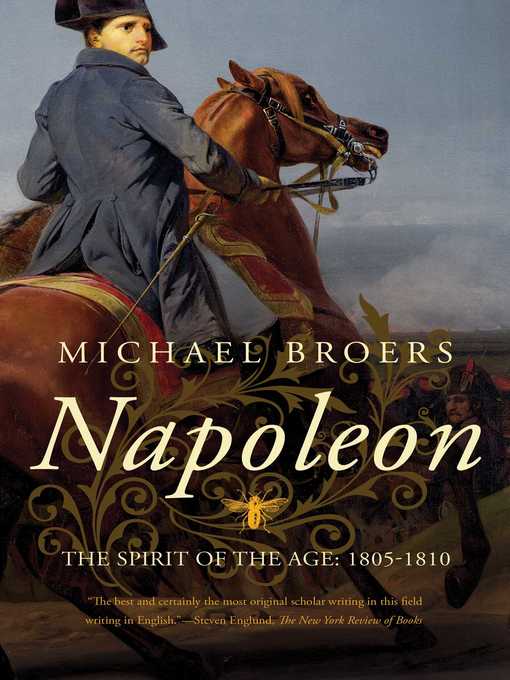
Napoleon
- اطلاعات
- نقد و بررسی
- دیدگاه کاربران
نقد و بررسی

February 1, 2018
The second of three volumes in the author's sweeping biography of the legendary general and emperor.Throughout the book, Broers (Western European History/Oxford Univ.; Napoleon: Soldier of Destiny, 2015, etc.) delivers page-turning accounts of the many military engagements of the time. Beginning with Austerlitz, he points out how the superior training of the French army gave them an advantage, producing a Grande Armee that could outmatch any other. Napoleon called for separate columns marching along parallel paths, sufficiently separated that they would be able to resupply from the surrounding countryside rather than waiting for supply trains. He could assess and deploy his formations as events developed. The Russian, Austrian, and British armies devised a plan of action, but there was no commander in chief; this lack of leadership proved fatal. Napoleon's men were immensely loyal to him, even if they grumbled. He went among them before a battle, encouraging bravery, revealing his trust, taking them into his confidence, and offering the respect due to good soldiers and intelligent free men. Austerlitz was a new kind of undertaking for him, as he had to lead more men over a vast theater outside the normal campaign season. But as the author shows, not all his battles were that successful. Napoleon ran into trouble in the far reaches of his empire and in bad weather, floods, and impassable terrain. He also committed his greatest error in Spain and Italy, dismissing guerrilla warfare. His overreliance on his siblings, especially Joseph, worked against him. Joseph flourished as an official in Paris, but he failed miserably in Italy and Spain. As in the first book, Broers provides an excellent character study of Napoleon. He shows how his subject's loathing of the Bourbons and the Catholic Church colored the actions of an otherwise steady leader, and he declares his intelligence was matched by few other leaders, among them Alexander I, Thomas Jefferson, and Toussaint L'Ouverture.Readers will eagerly await the third volume.
COPYRIGHT(2018) Kirkus Reviews, ALL RIGHTS RESERVED.

March 15, 2018
Based on Napoleon Bonaparte's (1769-1821) own correspondence, the memoirs of contemporaries, and the latest scholarship, this second volume in a projected three-part series by Broers (Western European History, Oxford Univ.; Napoleon: Soldier of Destiny) focuses on the five-year period that saw the French conqueror and his empire at the apex of power. During these years, Napoleon succeeded in battles such as Austerlitz (1805) and Wagram (1809); detailed maps chart these campaigns. Broers also outlines the domestic, political, and personal machinations that accompanied these victories. The author further explains how Napoleon aimed to place the army at the center of French national consciousness, sought to upstage the Catholic Church, and was haunted by fears, if not paranoia, over the future of his family dynasty. The book ends with the events of 1810, a time of fragile international peace, when Napoleon divorced his first wife, empress Joséphine, and wed Austrian princess Marie Louise. VERDICT Broers creates a brilliantly researched and exquisitely detailed work, though the heavy emphasis on military history will unfortunately deter all but the most serious fans of this period.--Marie M. Mullaney, Caldwell Coll., NJ
Copyright 2018 Library Journal, LLC Used with permission.

September 15, 2015
Like Andrew Roberts' Napoleon (2014), this profile of a much-written-about historical celebrity justifies itself by a new source, an ongoing scholarly project to collect Napoleon's correspondence. Broers' first biographical tome (of a projected two) extends to 1805. Many historians, Broers included, give approving interpretation to Napoleon's reforms, which delivered what the French generally wanted: an end to the Revolution's political instability, preservation of its main social changes, and peace with France's foreign enemies. How Napoleon achieved these goals occupies detailed swaths of Broers' narrative; more interesting to most readers will be his description of Bonaparte's apprenticeships for power. In Corsica, Toulon, Italy, Egypt, and Paris, Napoleon made his military reputation and honed political skills that vaulted him to the top, making him the epitome, in Broers' view, of a generation of ambitious men. Attentive to Napoleon's private life, Broers also accents Napoleon's human qualities in a largely positive, though hardly uncritical, portrait. In volume 2, Broers will take up Napoleon's responsibility for the wars of 180515. A solid addition to the Napoleonic canon.(Reprinted with permission of Booklist, copyright 2015, American Library Association.)




دیدگاه کاربران